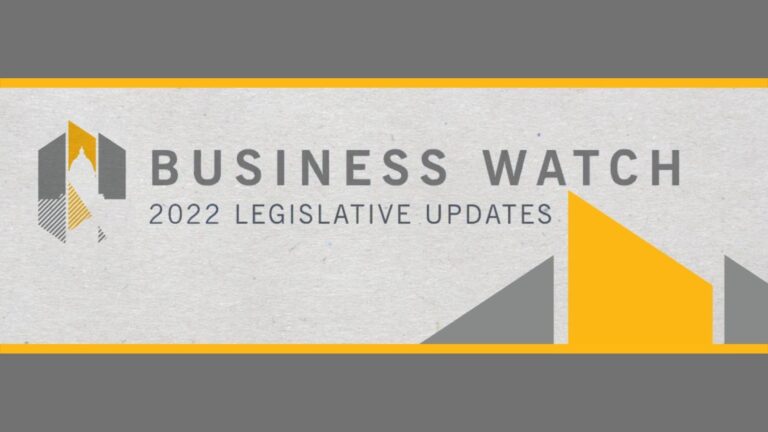As the legislative session concluded last Friday, passed bills are now making their way to Governor Cox for his signature or veto.
Over the past 45-days, the legislature passed 513 bills and a record $25 billion budget, with a significant increase in education funding, historical investment in infrastructure and water conservation, notable social services, and a tax cut for Utahns. Overall, this was a very successful legislative session for the business community.
During the session, the Salt Lake Chamber tracked and monitored 240 business-related bills and charted a path to build on the new economic geography of the state. This new geography requires a renewed focus both on business issues and quality of life.
The Chamber’s Board of Directors, with input from our various committees, task forces and industry roundtables, established top priorities that aligned with our Public Policy Guide as Priority Votes. Of the Chamber’s priority legislation, ALL NINE priority bills successfully passed through both chambers. We are also happy to report that NONE of the bills opposed by the Chamber passed.
The following summary represents many of the legislative actions business leaders should be aware of from this session. You can also visit the Chamber’s legislative watchlist for a larger view of the scope of our advocacy efforts on behalf of the business community.
Session Highlights:
Business Climate & Taxes
- SB 59, Tax Amendments, sponsored by Sen. McKay, was passed and signed by Gov. Cox. The bill offers a $193 million tax cut and provides an across-the-board tax cut and an earned income tax credit to support lower-income earners in Utah. The Chamber advocated for these tax cuts, especially the earned income portion as an anti-poverty mechanism to lift Utah families into the middle class.
- HB 444, Income Tax Revisions, sponsored by Rep. Spendlove, was passed. This bill provides a pass-through tax allowance that lowers federal income taxes. The Chamber advocated for and led a coalition to support this legislation that effectively allows a business to avoid the federal tax deduction cap. This bill will lower the federal tax burden for many Utah business owners while not decreasing state tax revenue.
- HB 35, Economic Development Modifications, sponsored by Rep. Handy, passed. This was an early Chamber priority bill that focuses the scope of EDTIF corporate tax incentives to targeted industries — advanced manufacturing, life sciences, financial services, technology, and aerospace and defense — and will provide more economic development support for rural communities.
- SB 212, Manufacturing Modernization Grant Program, sponsored by Sen. Millner, passed. The Chamber supported this bill as part of our efforts to provide statewide, industry-specific technical, and vocational training investments to include employer-led earn and learn opportunities. As manufacturing is expanding in our state, programs to enhance its development will create jobs and stabilize supply chains.
Water & Environment
- HB 410, Great Salt Lake Watershed Enhancement, sponsored by Speaker Wilson, passed. This bill creates a one-time appropriation toward expanding the Great Salt Lake watershed. The Chamber championed this bill as a key priority for the state’s future economic development efforts.
- HB 242, Secondary Water Metering Amendments, sponsored by Rep. V. Peterson, passed. The bill addresses secondary water supplies that will require metering by 2030. The Chamber advocated for this bill to help mitigate the overuse of limited natural resources.
Education
- HB 193, Full-Day Kindergarten, sponsored by Rep. Waldrip, passed. This bill is an important Chamber priority bill that we supported and endorsed as it helps give parents options for returning to the workforce.
- Within the overall budget, lawmakers passed a 6% increase to per-pupil funding, and also approved $10 million to go toward teacher bonuses given the strain they faced with the omicron surge. Many educators stepped up and worked overtime to substitute, as well for colleagues, during the variant spike in this winter. These bills support the Chamber’s priorities for developing an educated workforce and supporting the education community.
Housing Affordability
- SB 140, Housing and Transit Reinvestment Zone Amendments, sponsored by Sen. Harper, passed. We promoted this important Chamber priority because this bill seeks to expand housing and transit reinvestment zones along light rail or bus rapid transit.
- HB 462, Housing Affordability Amendments, sponsored by Rep. Waldrip, passed. This bill requires municipalities to create moderate-income housing plans and creates a prioritization for the Transportation Investment Funding (TIF). We recognize housing is a critical problem for Utah, and the Chamber advocated for the successful passage of this legislation.
Diversity and Inclusion
- SB 216, Modifications to Drivers License Examinations, sponsored by Sen. Escamilla, passed. The Chamber supported efforts to help refugees and new Utah residents ability to pass a driver’s license test in their native language.
Additionally, the Chamber led out, with support from the Utah Chamber Policy Coalition, in opposition to HB 60, Vaccine Passport Amendments. The bill sought to prohibit employers from coordinating with employees regarding vaccine requirements in the workplace. The position of the Chamber was opposition to government mandates and overreach. We support the rights of the individual business owner and recognize what may be right for one business is not necessarily right for all businesses. The bill passed through the House but was not voted on in the Senate and ultimately did not pass.
This legislative session required offense and defense to secure positive bills for the business community and the families they support, and avoid some bad laws. Thanks to everyone who participated in meetings, discussions and advocacy efforts, as well as our board members, Capitol Club members, and business leaders who testified on Capitol Hill. Your engagement allowed the Chamber Policy Team to mount a united front for the business community.
Stay tuned for the Chamber’s Business Champion Awards and our interim policy work.
We Stand as the Voice of Business.


